Golf injuries: most common, how to prevent, therapies for
July 11th, 2016 | 5 min. read
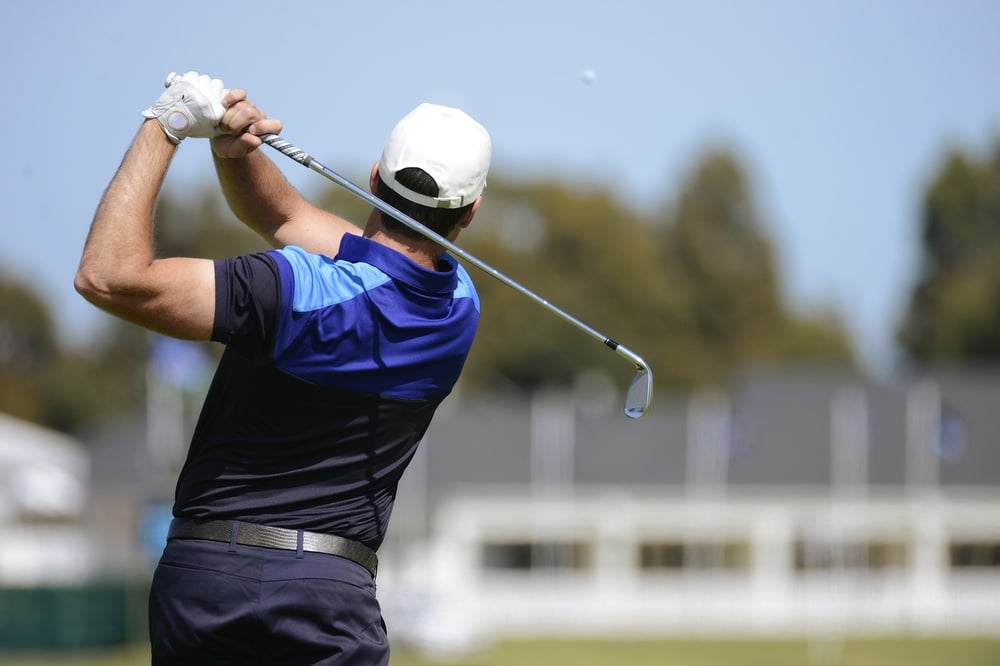
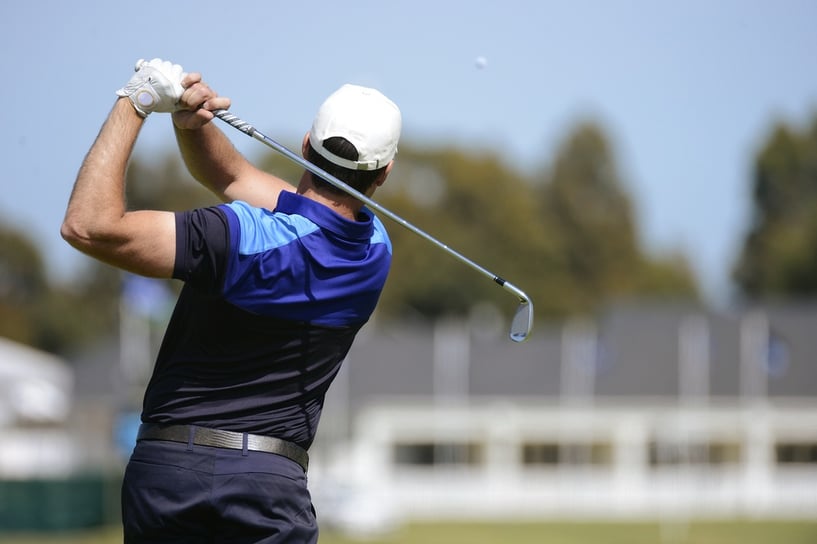
Are you a golfer with a sore lower back? Is your elbow, hand, wrist, knee, or shoulder causing you pain? You may have a golf injury brought on by poor form or repetitive strain.
Because it's low-impact and non-contact, golf is considered a safe sport that can be enjoyed by people into middle age and beyond. Indeed, golf is relatively easy on the body if played correctly — but injuries can still happen, especially as you age.
Poor form is one of the chief causes of injury among golfers. Overuse is another contributor; with time, the repetitive motions of twisting and swinging can lead to inflammation and tears in muscles and ligaments.
One of the best ways to avoid a golf injury is to be aware of common problems so you can take efforts to avoid them.
Most common golf injuries
Back injuries
Lower back pain is the top golf injury complaint brought to orthopedists. A poor golf swing, repeated hundreds of times, can put stress on the spine that can lead to tissue strains or more serious injuries like disc issues.
However, even a good swing with proper rotation, repeated over and over, can create wear and tear in your spine and muscles.
If you're sure your swing is correct but you're still feeling pain or stiffness, you may be experiencing a disc problem, osteoarthritis of the spine, osteoporosis, or a stress fracture.
Golfer's elbow (also spelled "golfers elbow")
Golfer's elbow, or medial epicondylitis, is a form of tendinitis characterized by inflammation or tiny tears of the tendon on the inside of the elbow joint. Golfer's elbow is an overuse injury caused by the forceful, repetitive action of gripping a club and swinging and striking a golf ball.
Pain from golfer's elbow can present at the inside of the elbow and radiate down the forearm and into the wrist. Symptoms often begin gradually and worsen over time, and are most pronounced when bending the arm or wrist. They include:
- soreness
- stiffness
- weakness
- tingling
Improper swing motion can increase your likelihood of getting golfer's elbow. Age is also a contributor.
Wrist injuries (including golfers wrist)
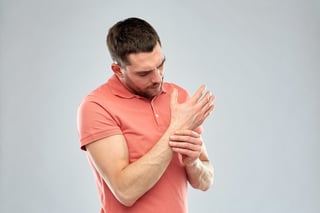
Wrist injuries happen to amateur golfers and professionals alike.
Gripping the club and bending the wrist can often lead to soreness, tenderness, and inflammation, especially along the top of the wrist.
Advancing age is a major contributor to wrist injury.
Repetitive strain and poor mechanics can also cause problems.
The most common wrist injuries seen in golfers are:
- Carpal tunnel syndrome. Numbness, tingling, loss of sensation, or weakness in the fingers may indicate the need for treatment, possibly surgery.
- Cartilage tears. Golfers often develop tears in the triangular fibrocartilage complex, the stabilizing cartilage at the outside of the wrist. Pain and swelling are common.
- Tendinitis (also spelled "tendonitis"). Inflammation and swelling of the tendons is a very commonly seen overuse injury brought on by repeatedly flexing and bending the wrist.
- Wrist bone fractures. Fracturing the hamate sometimes happens when a golfer strikes the ground hard with the club. The force can transfer into the wrist, leading to a break.
Hand and finger injuries
As with wrist injuries, hand and finger injuries are most often caused by overuse or by poor form. Typical injuries include:
- Hypothenar hammer syndrome (HHS). Repeated force against the palm of the hand can constrict blood flow to the fingers, leading to pain, numbness, tingling (pins and needles), and weakness.
- Tendinitis in the hands can be brought on by the repetitive strain of gripping the club. You may experience tenderness and swelling in the hand, particularly along the top.
- Thumb tenosynovitis. Repetitive stress on the base of the thumb can lead to inflammation of the sheath surrounding the tendon. Symptoms include tenderness and swelling.
- Trauma to the bone. Poor form combined with too much force (for example, when hitting the ball poorly or striking the ground) can transfer force into the fingers and hands, leading to fractures and bone deformations.
- Trigger finger. Repeated gripping of the club can create inflammation in the tendon sheath, causing fingers to "catch" and remain stuck in a bent position.
Shoulder injuries
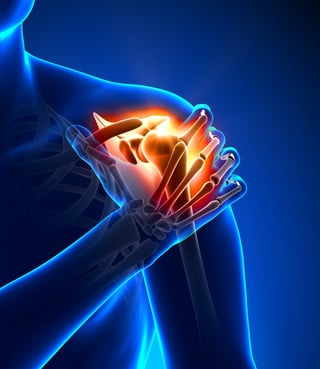
Golf swings engage the shoulders and include twisting motions, often with great speed and force. Repetitive strain can lead to injury, but so can a poor swing or a sudden force like striking a rock.
The most frequently seen shoulder injuries in golfers include:
- Impingement syndrome. Rotator cuff muscles can become pinched due to the narrowing of space where the tendon passes through the shoulder joint.
You may notice pain and tenderness due to inflammation. Raising your arms to the side or rotating the shoulder may also cause discomfort.
Impingement syndrome can be caused by form, posture issues, or structural anomalies of your joint. - Rotator cuff injuries. Rotator cuff tears, bursitis, or tendonitis can present as pain in the shoulder or upper arm when swinging your club.
You may feel sore immediately after play, or later in the day or evening. Difficulty raising the arms overhead, lifting them to the sides, or rotating the shoulders are also symptoms of injury.
Left untreated, rotator cuff tendonitis can lead to tendon rupture.
Hip injuries
The hips are engaged during the pivot and weight transfer of every golf swing. If your gluteal muscles and adductor muscles are not strong, flexible, and sufficiently warmed up before play, it is possible to sustain tears in the hip joint that are similar to rotator cuff tears in the shoulder.
Knee injuries
If you notice knee pain when twisting to hit the ball, you may have sustained damage to the knee due to the forces placed on the joint when you rotate the hips. Often, golf doesn't cause the injury, but rather exacerbates existing wear and tear.
Common knee problems that may be caused or made worse by golf include:
- ACL injuries or ligament tears. You may experience pain, swelling, instability in the joint, and a limited range of motion.
- Cartilage tears. Symptoms may include pain, swelling, or a grinding sound or sensation.
- Meniscus injuries and tears. Menisci are the c-shaped "shock absorbers" inside the knee joint. You may notice pain, swelling, or a buckling of your knee.
- Osteoarthritis of the knee. Arthritis is chronic degeneration of the cartilage at the ends of your leg bones where they meet at the knee joint. You may notice intermittent swelling, aching, or a creaking sensation in the knee.
Other golf injuries
Because a golf swing engages the entire body, it's also possible to experience neck strain or foot and ankle injuries like sprains, tendonitis, or blisters.
Don't forget, too, to hydrate and take care to avoid sunburn, sunstroke, and other heat injuries.
preventing golf injuries
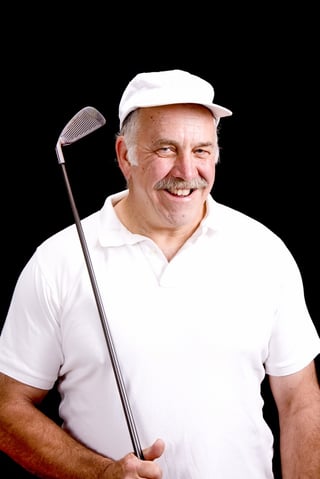
The factors that most often lead to golf injury are:
- Overuse. Avoiding excessive play helps prevent injury. Take rest days in between games, and limit how many practice balls you're hitting.
If you feel unusual pain or soreness anywhere in your body, try RICE therapy (rest, ice, compression, and elevation) for a few days, take NSAIDs (non-steroidal anti-inflammatory drugs, like naproxen or ibuprofen), and see an orthopedist to rule out injuries that might be made worse by activity.
- Poor technique. Because golf involves the coordinated movement of so many joints and muscle groups, proper form is key. A poor swing, repeated hundreds or thousands of time, can lead to injury.
Ground impact forces are also likely to result in injury. Learning how to hit the ball without hitting the ground can save you a lot of pain. Take the time to see a golf pro and learn the proper grip and the correct way to swing. - Not warming up. In one study, golfers who warmed up before playing experienced less than half as many injuries as those who did not.
Spending at least 10 minutes warming up your muscles before you play can cut your risk of injury dramatically. Try walking or jogging in place and doing dynamic (but gentle) muscle warm-ups like shoulder circles. - Poor physical condition. Lack of flexibility in particular can lead to injury. If your full range of motion is not available in one part of your body, other muscle groups need to compensate, which can increase the stress on those muscles and on the joints.
A stretching and strengthening program can help you to stay fit and balanced. Regular exercise between games also helps to prevent "weekend warrior" syndrome.
golf injury therapies
How do you treat a golf injury? Several therapies are available.
Non-surgical treatments
- RICE therapy and NSAIDs. For inflammation, you may be able to treat your injury with rest, ice, compression, elevation, and non-steroidal anti-inflammatory drugs like ibuprofen or naproxen.
- Physical therapy, exercise, and stretching. A physical therapist or orthopedist can show you stretches and exercises for golfers elbow (medial epicondylitis) and other injuries related to golf.
Back strengthening and stretching is also key to maintaining a healthy back. Knee conditioning programs and shoulder conditioning programs are also available at some orthopedic centers, including Coastal Ortho.
Surgery
If you're past the point of non-surgical treatments due to degeneration of bone or tissue, you may want to look into orthopedic surgery or medical treatments. Procedures can also help with fractures that aren't healing on their own.
Surgical therapies include:
- Arthroscopy (knee, shoulder, or ankle)
- Carpal tunnel repair
- Fracture care management
- Knee replacement or hip replacement
- Meniscus repair
- Rotator cuff surgery
- Spinal surgery
- Trigger finger release
An orthopedist can assess your condition and help you create a plan of action. Give Coastal Orthopedics located in Corpus Christi, TX a call and ask for a consultation. Telephone: 361.994.1166.
Article written by: Rob Williams, MD
Dr. Williams has been practicing orthopedic surgery in Corpus Christi since 1998. After graduating from Texas Tech hereceived his medical degree from the University of Texas at San Antonio. At the prestigious Campbell Clinic located at the University of Tennessee, Dr. Williams completed not only an Orthopedic Surgery Residency, but an additional year of Fellowship Training in Spine Surgery. Dr. Williams is dedicated to creating an excellent patient experience in the office or in the surgery suite.
Topics:

